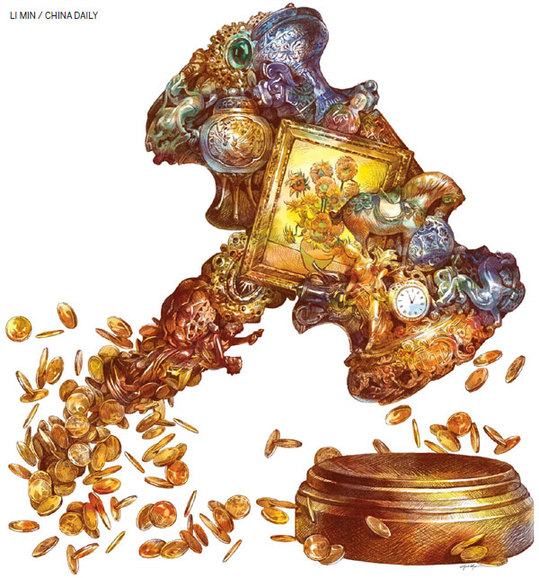State of the art
Updated: 2015-09-25 07:59
By Riazat Butt(China Daily Europe)
|
|||||||||||
China's cultural marketplace not only can weather the stock market storm - the long-term forecast is for solid growth, experts say
George Wong has been a collector for many years. The real estate mogul, who is in his 60s and whose net worth is about $1 billion (885 million euros), has gone from amassing albums and stamps as a youth to becoming a patron of the arts in the Asia-Pacific.
"I buy famous artists," he says. "I have Monet, Picasso, Magritte, Chagalle, Lichtenstein and Degas ... But I'd like to own a decent-sized Monet."

A bigger Monet, perhaps a painting of a water lily? "Yes," he replies. "I would like a water lily."
There is a shelf of Star Wars memorabilia in Wong's Beijing office and a metallic, bubble gum-pink machine gun mounted to the wall behind his desk.
"I like artwork. I started small, just collecting, collecting anything. It doesn't matter if you buy art for investment, to appreciate it or to show off. As long, as you're involved."
China is deeply involved in art, to the extent that it is a regular fixture in the world's top three art markets in terms of value. Its cohort of billionaires and their spending sprees is legendary, including $116 million dropped in one night at one auction on three paintings in May. How involved they are during auction season - which begins in September and ends in November - remains to be seen. China's stock market rout, which started in mid-June and has spiraled downward since, has hit the country's super rich.
On July 8 Forbes said that the 205 Chinese billionaires tracked by its Real-time Billionaires List lost a total of $195 billion since the Shanghai Composite Index hit its peak on June 12.
China's richest man, Wang Jianlin, head of real estate giant Dalian Wanda, lost $6.5 billion in that period as share prices of his two public companies fell, Forbes says, adding that he was still worth $32.3 billion and remained Asia's richest man.
Wang was one of the three deep-pocketed Chinese collectors that night in May. He spent $20.4 million on Monet's Bassin aux nympheas les rosiers. Two year earlier, in November 2013, he spent $28.2 million on Picasso's Claude and Paloma, a portrait of the Spanish artist's children.
The list's biggest loser, says Forbes, was the copper and cable entrepreneur Wang Wenyin, who lost $7.3 billion in that period, more than any other Chinese billionaire on the list.
Internet services giant Tencent's stock, traded in Hong Kong, dropped 13 percent on July 8, and its chairman Pony Ma lost $1.2 billion on a single day, Forbes says.
But international auction houses are confident that China is capable of weathering the storm because it has enough wealth - and enough wealthy collectors - to absorb financial shocks. President of Christie's China, Cai Jinqing, says: "Like any market there are cycles and fluctuations. This is one of those things. Our strategy is geared toward the long term. We have to adapt."
Today's Top News
Saudi king orders probe as death toll set to rise
China willing to cooperate with US on cybersecurity
New economy drives growth
Hundreds killed in Saudi Hajj stampede
Volkswagen to pick Porsche boss as new CEO
EU leaders claim unity regained, pledge aid for Syrians
Business leaders, experts applaud Xi's speech in Seattle
Premier encourages innovation
Hot Topics
Lunar probe , China growth forecasts, Emission rules get tougher, China seen through 'colored lens', International board,
Editor's Picks

|

|

|

|

|

|






